The critics are loud, but weather experts still say sub-freezing temperatures do not discredit global warming theories. USA TODAY
The recent brutal American cold snap was a freak of nature, scientists say, who added that such extreme cold is far less likely to occur than it used to.
Specifically, the frigid, record-breaking two-week cold spell that began in late December is now 15 times rarer than it was a century ago, according to a team of international scientists who study if extreme weather events are natural or more likely to happen because of climate change.
"Cold waves like this occurred more frequently in the climate of a century ago and the temperature of two-week cold waves has increased throughout North America, which is consistent in a climate of global warming," said Geert Jan van Oldenborgh, a senior researcher at the Royal Netherlands Meteorological Institute.
The study by the World Weather Attribution group analyzed weather records dating back to 1880 and found the cold weather that hit a swath of the U.S. from Maine to Minnesota tends to happen once every 250 years. In the early 1900s, it happened about once every 17 years.
Much of the U.S. celebrated the beginning of 2018 in the grip of record-breaking cold temperatures Time
Climate change has made such cold spells less common and less intense, the group said. The scientists say cold waves are now, on average, approximately 4 degrees warmer than they used to be.
World Weather Attribution is an international effort to analyze the possible influence of climate change on extreme weather events, such as storms, extreme rainfall, heat waves, cold spells and droughts. It's a partnership of Climate Central and several universities.
Regarding a possible climate change link through the effects of lower sea ice extent in the Arctic, the research team said the climate pattern that led to this two-week cold period did not occur more frequently in recent years.
“We do not find any evidence of intensification of this type of cold wave due to climate change; in fact, the Arctic air moving south is now warmer, which accounts for the trend of warmer cold waves,” said Claudia Tebaldi, a science fellow at Climate Central.
They found that although this type of extreme cold event has decreased in both intensity and frequency over the last century, it will continue to occur.
“This cold wave was exceptional,” said Gabe Vecchi, a geoscientist at Princeton University, “for being 7°F to 11°F colder than the coldest two weeks in recent decades and for occurring so early in the season, especially in light of the decrease in intensity and frequency of cold waves over the past century.”
Beat those cold weather blues. Buzz60
Meteorologist Ryan Maue of weather.us, who was not part of the World Weather Attribution team of researchers, said "this attribution study is a straightforward yet concise analysis of the recent record cold in the context of our historical records. From the recent National Academy 'attribution science' review, we have 'high certainty' and 'high confidence' in attributing the reduction in extreme cold events to human caused climate change."
"The Climate Central led study conclusions fit exactly with that consensus opinion: less frequent and severe cold is a consequence of global warming."
However, Maue does not agree that global warming due to lack of Arctic ice can be directly linked in any way to these sort of cold waves, as some scientists have claimed: "Instead of baffling the public with emerging theories or counter-intuitive explanations, scientists should simply explain what we confidently know: winters will still exhibit extreme cold for decades to come but the historical trend is toward less frequent and extreme cold due to global warming."
Contributing: The Associated Press
Posted!
A link has been posted to your Facebook feed.














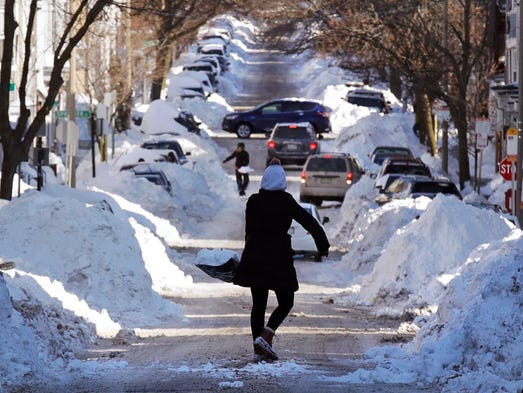

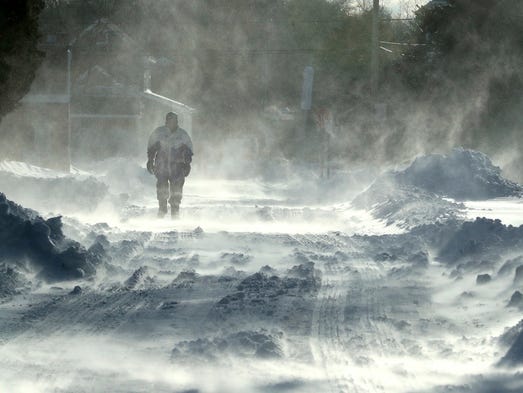
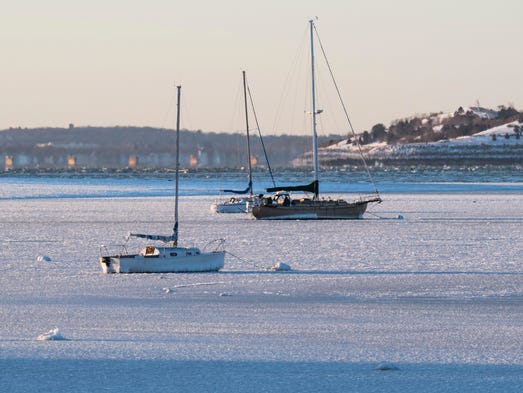

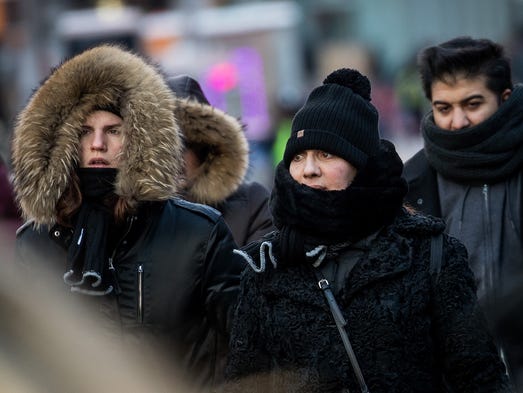





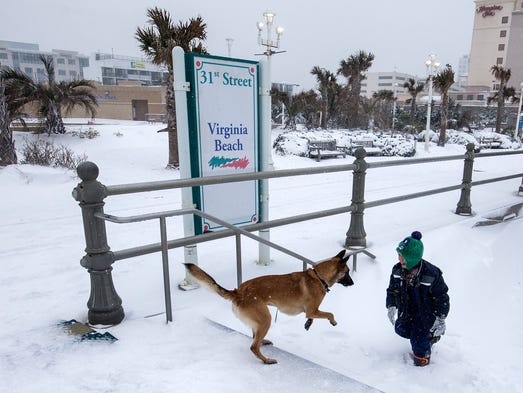







































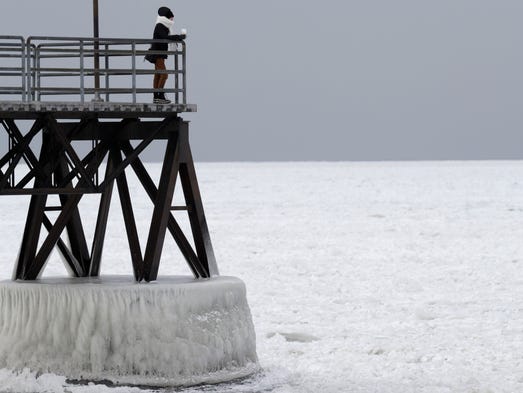





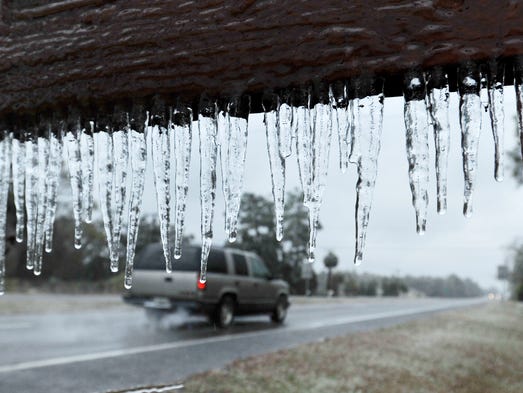



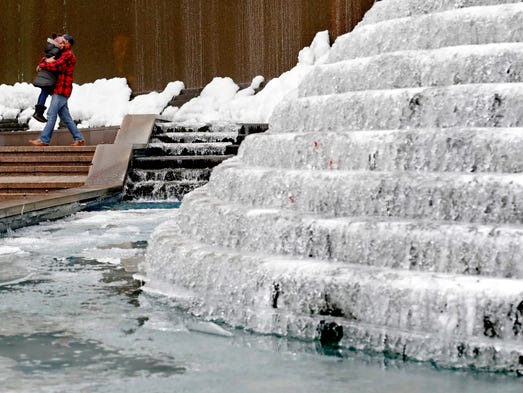


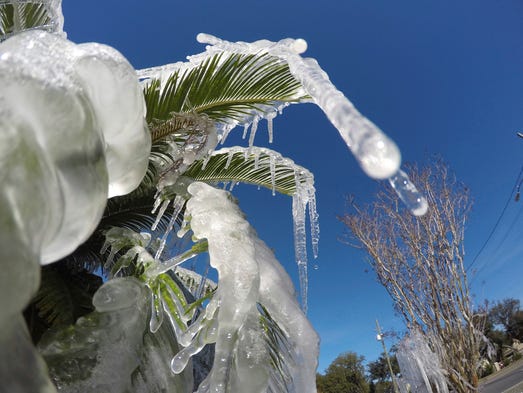



















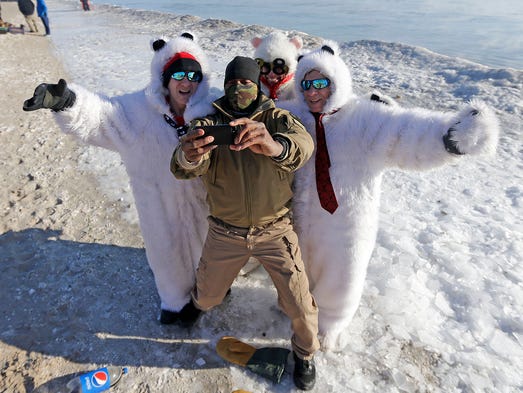
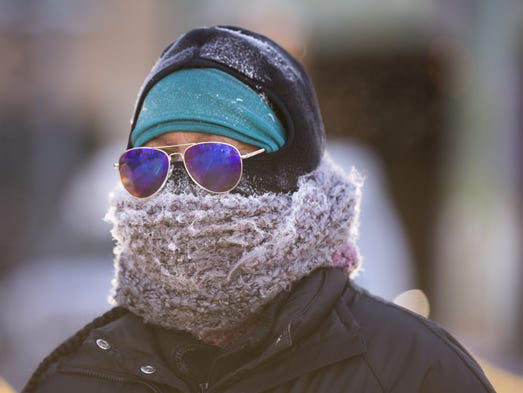































































Like this topic? You may also like these photo galleries:
![Gusty wind picks up snow accumulated on the ground]() 1 of 163
1 of 163![A person walks in the snow on King Street in Charleston,]() 2 of 163
2 of 163![People walk on the ice covered beach along Lake Michigan]() 3 of 163
3 of 163![Ice floats in the Hudson River in Lower Manhattan with]() 4 of 163
4 of 163![An overnight 5 alarm fire in the Dorchester neighborhood]() 5 of 163
5 of 163![Katherine Rozenbert and her granddaughter Rebecca,]() 6 of 163
6 of 163![People walk past a massive snow pile near Astor place]() 7 of 163
7 of 163![An automobile covered in snow with windshield wipers]() 8 of 163
8 of 163![A Boston Fire Department Firefighter's helmet is crusted]() 9 of 163
9 of 163![A man shovels snow from a footpath in New York.]() 10 of 163
10 of 163![A homeless man carries his belongings near the White]() 11 of 163
11 of 163![Tourists have photos taken on the steps of the Lincoln]() 12 of 163
12 of 163![People brave the cold weather as they walk on the street]() 13 of 163
13 of 163![People brave the cold weather as they walk on the street]() 14 of 163
14 of 163![Mollie Lane carries a shovel-full of snow down the]() 15 of 163
15 of 163![A woman walks through steam during an arctic blast]() 16 of 163
16 of 163![A pedestrian walks through blowing snow along Stites]() 17 of 163
17 of 163![Sailboats are frozen in ice off the coast of Winthrop,]() 18 of 163
18 of 163![Wilfredo Rodriguez of Project Place, keeps the pathway]() 19 of 163
19 of 163![Bundled up pedestrians walk through Times Square in]() 20 of 163
20 of 16321 of 163
22 of 163
23 of 163
![A woman walks down snow-covered Maverick Street in]() 24 of 163
24 of 163![A vehicle parked on Abbott Avenue is surrounded by]() 25 of 163
25 of 163![Jayden Willey, 8, plays with a dog named Esco in the]() 26 of 163
26 of 163![Chunks of ice cover the Chicago River on Jan. 4, 2018,]() 27 of 163
27 of 163![Youths play ice hockey on a frozen pond at Franklin]() 28 of 163
28 of 163![A woman stands with an umbrella at the corner of Front]() 29 of 163
29 of 163![A man shovels his walkway and stairs after heavy snowfall]() 30 of 163
30 of 163![Front loaders dump snow into a melter while clearing]() 31 of 163
31 of 163![Pedestrians cross the street by the Old State House]() 32 of 163
32 of 163![The U.S. Capitol is seen with the frozen reflecting]() 33 of 163
33 of 163![Firefighter Justin Plaza pulls a rescued motorist to]() 34 of 163
34 of 163![A woman struggles in the deep snow in Revere, Mass.]() 35 of 163
35 of 163![A front loader is used to clear snow from the parking]() 36 of 163
36 of 16337 of 163
![John Texada walks through Market Square with his 5]() 38 of 163
38 of 16339 of 163
40 of 163
![The snowstorm affecting the region has created white]() 41 of 163
41 of 163![Weather conditions deteriorate as a low pressure system]() 42 of 163
42 of 163![Morgan Foster walks in the wind and snow along W. Main]() 43 of 163
43 of 163![A pedestrian crosses a street during a brief snowfall]() 44 of 163
44 of 163![Julio Morales shovels the sidewalks along in Somerville,]() 45 of 163
45 of 163![The I-684 and Saw Mill Parkway interchange in Katonah,]() 46 of 163
46 of 16347 of 163
48 of 163
![Commuters board a MetroNorth train headed to Grand]() 49 of 163
49 of 163![Traffic moves along Interstate 684 in Katonah, N.Y]() 50 of 163
50 of 16351 of 163
52 of 163
![Parker, owned by Donald Stagaard enjoys an early morning]() 53 of 163
53 of 163![Seeing her first winter weather, 9-month-old Roxie,]() 54 of 163
54 of 163![Vehicles move along a snow and ice covered Interstate]() 55 of 163
55 of 163![Zoe Poole uses a bodyboard to slide down a hill she]() 56 of 163
56 of 163![Ramon Martinez takes advantage of little car traffic]() 57 of 163
57 of 163![Savannah College of Art and Design student Helene Fischer]() 58 of 163
58 of 163![Mirni Dulany, 10, gets a taste of the snowflakes as]() 59 of 163
59 of 163![Icicles hang from a street sign on Jan. 3, 2018, in]() 60 of 163
60 of 163![Children from the Hoffman and Lynns families build]() 61 of 163
61 of 163![A car is partially covered by ice following an overnight]() 62 of 163
62 of 163![Icicles cling to power lines behind row homes in Catonsville,]() 63 of 163
63 of 163![A tree is covered by ice following an overnight water]() 64 of 163
64 of 163![Ice forms on a break wall along Lake Erie with the]() 65 of 163
65 of 163![Michele King, 26, looks out over frozen Lake Erie on]() 66 of 163
66 of 163![A couple makes photographs upon a frozen pond at Franklin]() 67 of 163
67 of 163![Michigan State Police respond to a multi-vehicle accident]() 68 of 163
68 of 163![Ice covers large portions of the Hudson River near]() 69 of 163
69 of 163![woman photographs a frozen fountain in Bryant Park]() 70 of 163
70 of 163![Bundled up pedestrians walk through Midtown Manhattan]() 71 of 163
71 of 163![Icicles hang from the "Welcome to Hilliard sign" in]() 72 of 163
72 of 163![Sydney Freed, 4, of Orlando, Fla., throws one of her]() 73 of 163
73 of 163![Omar Elkhalidi uses a wood shim to scrape ice off his]() 74 of 163
74 of 163![A frozen fountain in Historic Forsyth Park still works]() 75 of 163
75 of 163![Kenneth Freeman, carries his daughter Alora, 8, as]() 76 of 163
76 of 163![A New Jersey State Police boat, in view of The Battleship]() 77 of 163
77 of 163![Icicles form on a outdoor string of lights as temperatures]() 78 of 163
78 of 163![Water is frozen on a tree in Fort Walton Beach, Fla.]() 79 of 163
79 of 163![Aiden Cook, 12, from Atlanta, Ga., flies off his sled]() 80 of 163
80 of 163![Visitors walk at a frozen Niagara Falls in views from]() 81 of 163
81 of 163![A trio of swans gracefully glide in the frigid water]() 82 of 163
82 of 163![A farmer walks his horse across a baron field in freezing]() 83 of 163
83 of 163![Sherlin Galicia, left, Alexander Galicia, center, and]() 84 of 163
84 of 163![A coin operated binocular is covered with snow on Goat]() 85 of 163
85 of 163![Nancy Alexander of Olyphant, Pa., bundles up against]() 86 of 163
86 of 163![Ducks fly past frozen foliage as steam rises from the]() 87 of 163
87 of 163![A commuter makes her way to work in sub-zero temperatures]() 88 of 163
88 of 163![Commuters brave sub-zero temperatures as they make]() 89 of 163
89 of 163![Hunter and Haylee Cooper along with their friends sled]() 90 of 163
90 of 163![Icicles form on the tritons in the Forsyth Park Fountain]() 91 of 163
91 of 163![A woman is bundled up as she walks in subzero weather]() 92 of 163
92 of 163![Ice crystals form on a window in Lawrence, Kan. on]() 93 of 163
93 of 163![A woman poses for a photograph in front of the partially]() 94 of 163
94 of 163![A layer of ice is broken into pieces floating along]() 95 of 163
95 of 163![Two horses covered in blankets graze through the snow]() 96 of 163
96 of 163![Michael Labingo wraps himself in blankets as the Star]() 97 of 163
97 of 163![Ring-billed gulls rest on top of a layer of ice at]() 98 of 163
98 of 16399 of 163
![Amber Stewart of Terre Haute is completely covered]() 100 of 163
100 of 163![Hockey fans dressed for the cold during the 2018 Winter]() 101 of 163
101 of 163![Fans stand in line in subzero temperatures to enter]() 102 of 163
102 of 163![Pedestrians are bundled up against frigid temperatures]() 103 of 163
103 of 163![April Nickila and Christina Liesmaki try to stay warm]() 104 of 163
104 of 163![Steam rises from Lake Superior as the ship St. Clair]() 105 of 163
105 of 163![Elliot Shores, 5, hits a puck into a net on Dec. 30,]() 106 of 163
106 of 163![Fans stand bundled against the cold weather in the]() 107 of 163
107 of 163![A light dusting of snow on some type of berrys in the]() 108 of 163
108 of 163![Sea smoke, or steam fog, rises off the water in Dorchester]() 109 of 163
109 of 163![The cold snap continues as a man walks on the pier]() 110 of 163
110 of 163![Jose Nieto uses a leaf blower to clear snow from the]() 111 of 163
111 of 163![Aiden Lafuente, 12, left, looses a boot as his brother]() 112 of 163
112 of 163![Ben Seyboldt plays in the snow in his front yard in]() 113 of 163
113 of 163![Ron Rodney of Erie and his daughter Leah, 4, climb]() 114 of 163
114 of 163![Kevin Deiner of Erie, Pa., pushes his Ford Escape out]() 115 of 163
115 of 163![Timothy Gigone, 51, of Erie, Pa., skis south on Sassafras]() 116 of 163
116 of 163![A woman bundles up to protect from the extreme cold]() 117 of 163
117 of 163![United States Postal Service carrier Nate McKeever]() 118 of 163
118 of 163![Samantha Dement-Graham shovels her neighbor's sidewalk]() 119 of 163
119 of 163![Pam Voetberg brushes her car off on University Avenue]() 120 of 163
120 of 163![Raid H digs his car out in his driveway on Dec. 29,]() 121 of 163
121 of 163![A man rides on his bicycle as fresh snow falls on Dec.]() 122 of 163
122 of 163![Workers clear streets on Dec. 29, 2017, in downtown]() 123 of 163
123 of 163![Jael Lippert cross country skis on Dec. 29, 2017, in]() 124 of 163
124 of 163![Jason Goldstein, left, and Jon Ross, side across the]() 125 of 163
125 of 163126 of 163
127 of 163
128 of 163
129 of 163
130 of 163
131 of 163
132 of 163
133 of 163
134 of 163
![Pedestrians try to keep warm while walking in New York's]() 135 of 163
135 of 163![A couple embraces as they brave the cold weather for]() 136 of 163
136 of 163![Soledda Hernandez stands on the roof of her car as]() 137 of 163
137 of 163![Footprints are formed in the ice at the scene of a]() 138 of 163
138 of 163![Despite sub-zero wind chill, Mike Beeson of Lansing]() 139 of 163
139 of 163140 of 163
141 of 163
![Angler Ron White is bundled up against the cold as]() 142 of 163
142 of 163![Trevor Oudenhoven, an employee of Pfefferle Landscaping,]() 143 of 163
143 of 163144 of 163
145 of 163
146 of 163
147 of 163
148 of 163
149 of 163
150 of 163
151 of 163
152 of 163
153 of 163
![Residents in Erie, Pa. dig out on Dec. 26, 2017, after]() 154 of 163
154 of 163![Birds take flight over the frigid waters below the]() 155 of 163
155 of 163![With snow on the ground, a person walks across the]() 156 of 163
156 of 163![Elizabeth Gallagher and Ian Fullmer, 10 enjoy sledding]() 157 of 163
157 of 163158 of 163
159 of 163
![Ice covers tree branches on Dec. 26, 2017 in Marlborough,]() 160 of 163
160 of 163161 of 163
162 of 163
163 of 163


































































































































































